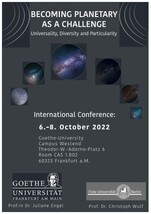Becoming Planetary
„Being planetary as praxis involves an attention to questions of colonial imaginations and control, of racial and economic exclusions, of environmental injustices, and of universal science and global abstractions that might be de-figured, superseded, and transformed in the search for more open and just ways of being human and planetary that are still to be re-imagined“ (Gabrys 2018)
With the proclamation of the Anthropocene it is emphasized how human activity has shaped the conditions of life on our planet. While the anthropocentric perspective by definition takes humans and their actions as its starting point and addresses them as sovereign, planetary thinking challenges this view. The Becoming Planetary project advances the related field of research by understanding the planetary as practice. On the one hand, the project aims to build an international research group that brings together interdisciplinary perspectives on the planetary. On the other hand, at the Department of School and Cultural Transformation, we contuoure questions and subject areas of the planetary which are specific for education. We ask what it means to understand human beings not only as a sovereign counterpart of nature or even as superior to it, but instead as entangled, involved and inseparably connected with the non-human. Theoretically, we refer to post-digital, post-structuralist, feminist and post-colonial perspectives, from which transnational relations of inequality become just as interrogable as the humanist liberal understanding of the subject and thus ultimately also the category of the human being itself. From this, empirical research will be conducted on how the human, the more-than-human and the inhumane are intertwined in the context of education and against the backdrop of social and cultural transformations and knowledge orders.
Contact: Dr. Saskia Terstegen
References
- Chakrabarty, D. (2021): Das Klima der Geschichte im planetarischen Zeitalter. Frankfurt am Main: Suhrkamp.
- Gabrys, J. (2018). Becoming Planetary. https://www.e-flux.com/architecture/accumulation/217051/becoming-planetary/
- Haraway, D. (1988). Situated knowledges: The science question in feminism and the privilege of partial perspective. FeminisStudies, 14(3), 575–599.
- McKittrick, K. (Ed.). (2015). Sylvia Wynter: On being human as praxis. Duke University Press.
- Spivak, G. C. (2012). An Aesthetic Education in the Era of Globalization. Cambridge, MA: Harvard University Press.
- von Redecker, E. (2020). Revolution für das Leben. Philosophie der neuen Protestformen [Revolution for life. Philosophy of the new forms of protest]. Frankfurt am Main: Fischer Verlag.
DEUTSCH
Mit dem Ausrufen des Anthropozäns wird betont, wie die menschliche Tätigkeit die Lebensbedingungen auf unserem Planeten geprägt hat. Während die anthropozentrische Perspektive per definitionem den Menschen und sein Handeln zum Ausgangspunkt nimmt und als souverän adressiert, fordert das Planetarische Denken diese Sicht heraus. Das Projekt „Becoming Planetary“ treibt das hiermit verbundene Forschungsfeld voran, indem das Planetarische als Praxis versteht. Ziel des Projektes ist es zum einen, einen internationalen Forschungszusammenhang aufzubauen, der interdisziplinäre Perspektiven auf das Planetarische bündelt. Zum anderen werden am Arbeitsbereich für Schule und Kulturelle Transformation spezifisch erziehungswissenschaftliche Fragestellungen und Gegenstandsfelder des Planetarischen konturiert.Wir fragen danach, was es bedeutet, den Menschen nicht allein als souveränes Gegenüber der Natur oder als ihr gar überlegen zu verstehen, sondern stattdessen als verstrickt, involviert und untrennbar mit nicht-menschlichen Akteuren verbunden. Theoretisch beziehen wir uns dabei auf postdigitale, poststrukturalistische, feministische und postkoloniale Perspektiven, aus denen transnationale Ungleichheitsverhältnisse ebenso befragbar werden wie das humanistisch liberale Subjektverständnis und damit letztlich auch die Kategorie des Menschen selbst. Hiervon ausgehend soll empirisch beforscht werden, wie der Mensch, das Nicht-Menschliche und das Unmenschliche im Kontext von Bildung und vor dem Hintergrund sozialer und kultureller Transformationen und Wissensordnungen verschränkt sind.
Kontakt: Dr. Saskia Terstegen
Literatur
- Chakrabarty, D. (2021): Das Klima der Geschichte im planetarischen Zeitalter. Frankfurt am Main: Suhrkamp.
- Gabrys, J. (2018). Becoming Planetary. https://www.e-flux.com/architecture/accumulation/217051/becoming-planetary/
- Haraway, D. (1988). Situated knowledges: The science question in feminism and the privilege of partial perspective. FeminisStudies, 14(3), 575–599.
- McKittrick, K. (Ed.). (2015). Sylvia Wynter: On being human as praxis. Duke University Press.
- Spivak, G. C. (2012). An Aesthetic Education in the Era of Globalization. Cambridge, MA: Harvard University Press.
- von Redecker, E. (2020). Revolution für das Leben. Philosophie der neuen Protestformen [Revolution for life. Philosophy of the new forms of protest]. Frankfurt am Main: Fischer Verlag.
- Yusoff, K. 2018. A billion black Anthropocenes or none. Minneapolis: University of Minnesota Press.







